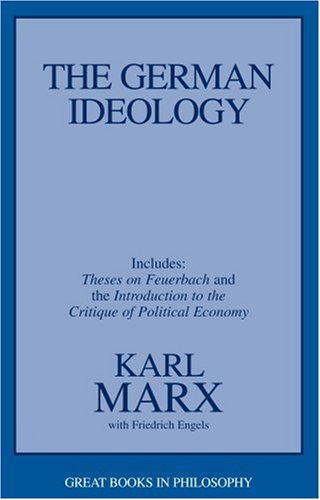Marx, Karl. The German Ideology: Including Theses on Feuerbach and Introduction to The Critique of Political Economy. Amherst, N.Y.: Prometheus Books, 1998.
Excerpt:
“As we hear from German ideologists, Germany has in the last few years gone through an unparalleled revolution. The decomposition of the Hegelian philosophy, which began with Strauss, has developed into a universal ferment into which all the “powers of the past” are swept. In the general chaos mighty empires have arisen only to meet with immediate doom, heroes have emerged momentarily only to be hurled back into obscurity by bolder and stronger rivals. It was a revolution beside which the French Revolution was child’s play, a world struggle beside which the struggles of the Diadochi [successors of Alexander the Great] appear insignificant. Principles ousted one another, heroes of the mind overthrew each other with unheard-of rapidity, and in the three years 1842-45 more of the past was swept away in Germany than at other times in three centuries.
All this is supposed to have taken place in the realm of pure thought.
Certainly it is an interesting event we are dealing with: the putrescence of the absolute spirit. When the last spark of its life had failed, the various components of this caput mortuum began to decompose, entered into new combinations and formed new substances. The industrialists of philosophy, who till then had lived on the exploitation of the absolute spirit, now seized upon the new combinations. Each with all possible zeal set about retailing his apportioned share. This naturally gave rise to competition, which, to start with, was carried on in moderately staid bourgeois fashion. Later when the German market was glutted, and the commodity in spite of all efforts found no response in the world market, the business was spoiled in the usual German manner by fabricated and fictitious production, deterioration in quality, adulteration of the raw materials, falsification of labels, fictitious purchases, bill-jobbing and a credit system devoid of any real basis. The competition turned into a bitter struggle, which is now being extolled and interpreted to us as a revolution of world significance, the begetter of the most prodigious results and achievements.
If we wish to rate at its true value this philosophic charlatanry, which awakens even in the breast of the honest German citizen a glow of national pride, if we wish to bring out clearly the pettiness, the parochial narrowness of this whole Young-Hegelian movement and in particular the tragicomic contrast between the illusions of these heroes about their achievements and the actual achievements themselves, we must look at the whole spectacle from a standpoint beyond the frontiers of Germany.
[In the first version of the clean copy there follows a passage, which is crossed out:] |p. 21|
We preface therefore the specific criticism of individual representatives of this movement with a few general observations, elucidating the ideological premises common to all of them. These remarks will suffice to indicate the standpoint of our criticism insofar as it is required for the understanding and the motivation of the subsequent individual criticisms. We oppose these remarks |p. 3| to Feuerbach in particular because he is the only one who has at least made some progress and whose works can be examined de bonne foi.
1. Ideology in General, and Especially German Philosophy
A. We know only a single science, the science of history. One can look at history from two sides and divide it into the history of nature and the history of men. The two sides are, however, inseparable; the history of nature and the history of men are dependent on each other so long as men exist. The history of nature, called natural science, does not concern us here; but we will have to examine the history of men, since almost the whole ideology amounts either to a distorted conception of this history or to a complete abstraction from it. Ideology is itself only one of the aspects of this history.”
Online:
Amazon
Free edition (Collected Works)
